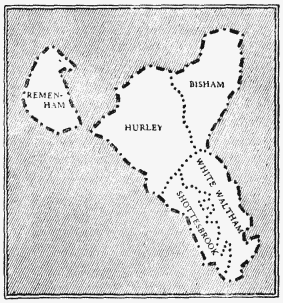Pages 137-138
A History of the County of Berkshire: Volume 3. Originally published by Victoria County History, London, 1923.
This free content was digitised by double rekeying. All rights reserved.
THE HUNDRED OF BEYNHURST
CONTAINING THE PARISHES OF
In 1086 the hundred of Beynhurst (fn. 1) included Cookham, Bisham, Bras, (fn. 2) Elentone (comprising South Elington, later Maidenhead, and North Elington in Cookham), Hurley, Shottesbrook, White Waltham and Waltham St. Lawrence. (fn. 3) Remenham at this date was returned under the hundred of Charlton, (fn. 4) but from the 13th century onwards it is found in Beynhurst. (fn. 5) Cresswell in Bray parish is given under Beynhurst in the 13th and 14th centuries, (fn. 6) also Cruchfield in Cookham in 1327 and later, (fn. 7) and Elington under the name of Knightelynton. (fn. 8) The boundaries between these two parishes and White Waltham have always been a matter of dispute. (fn. 9)

Index Map to the Hundred of Beynhurst
Waltham St. Lawrence was added to the Bishop of Winchester's hundred of Wargrave (fn. 10) before the end of the 13th century. (fn. 11)
The royal manor of Cookham became a separate hundred before the end of the first half of the 13th century. (fn. 12) The two estates of Cookham and Bray remained for a long period in the Crown. In the 13th century a jurisdiction is found called the Liberty of the Forest, (fn. 13) the Liberty of the Seven Hundreds, (fn. 14) or, as later, the Seven Hundreds of Cookham and Bray. The court of the Seven Hundreds was the chief court for the forest district, and probably the courts of the hundreds within this area eventually became merged in it. (fn. 15) Court Rolls of the 15th century show that the court of the Seven Hundreds of Cookham and Bray was attended by the townships of Shottesbrook, Remenham and Knight Elington (fn. 16) in Beynhurst Hundred. Probably private jurisdictions account for the absence of the rest. (fn. 17) For fiscal purposes the Seven Hundreds were generally assessed as separate units, (fn. 18) but sometimes merged under the common name of Cookham and Bray. (fn. 19) Warrants for the rating of ship money were delivered to the high constable of Beynhurst Hundred in 1638. (fn. 20)


